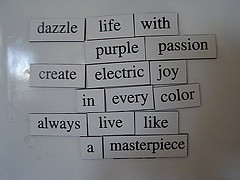 |
| Back in the day, I used to use something like this. |
I remember when I was a wee lad and I used a typewriter. I thought it was so great to be able to type things--seemed to make it so official. I even had a typewriter that could correct an error using a white-out key (yeah, that was pretty big-time!). Then I upgraded to the newfangled word processor that had this little window above the keyboard that would show the text before it was set on paper (seemed so super-advanced at the time).
Then computers popped up and things advanced even more...and then WHAM!, in 1995 Microsoft Word (Works actually came out first) came along and everything changed. In fact, the amount of unique features on Word that help writers with the revision process can't be discussed in a single blog post. Heck, I consider myself an expert with Word and even I seem to learn something new now and then when using Word.
So, then, I'll just discuss a couple features I use a lot. First, the find/replace feature. All writers know about these beauties, and if they don't, these are probably the writers who are still using typewriters. How helpful is it to be able to see the frequency with which you use "just" or "I mean" by using these features? And how cool is it that you can decide to change a character's name toward the end of your first draft and use the find/replace feature to do it in one quick minute. Second, I really love the track-changes that help when writers revise with crit partners or agents or editors. Invaluable.
How about you? What Microsoft Word features do you like to use here in the year 17 A.W.?































